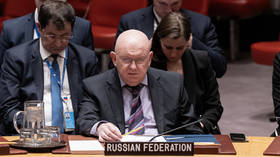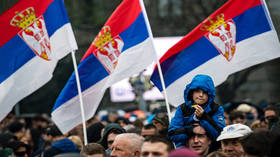Russia rebukes Germany over ‘Srebrenica genocide’ resolution

A resolution put to the UN on ‘Srebrenica genocide’ has divided the General Assembly, demonized the former Yugoslavia, and endangered the peace in Bosnia-Herzegovina, Russian envoy to the UN Vassily Nebenzia has said.
Nebenzia spoke after the General Assembly took a vote on the proposal by Germany and Rwanda to designate July 11 as ‘Srebrenica genocide’ remembrance day. Of 193 UN member states, 84 voted in favor, 19 against, and 68 abstained.
“Germany, which started two world wars in the 20th century, killed millions of people in concentration camps, committed mass atrocities in Africa, and took part in the dismemberment of Yugoslavia, that country is now trying to lecture others about the importance of reconciliation,” Nebenzia said.
Russia strongly believes that Germany lacks the moral authority to even bring up the word ‘genocide’ for anything other than its own atrocities, Nebenzia said, noting that the UN itself came into being to ensure that Nazi crimes against humanity never happen again.
Using the resolution to pass a political declaration amounted to “abuse” of the General Assembly, the Russian permanent representative said, calling its adoption a “Pyrrhic victory” for its sponsors as more countries were opposed or abstained.
“One thing is clear: the [resolution’s] sponsors are deliberately pushing Bosnia into conflict, without regard for the price that country paid during the civil war of the 1990s, when 100,000 people died,” Nebenzia told the UN General Assembly. He described the resolution as “a threat to peace and security in the entire region.”
The Dayton Peace Agreement ended the 1992-95 civil war in Bosnia by partitioning the country between Republika Srpska (RS) and the Federation. The country’s constitution requires all three communities – the Bosnian Muslims (Bosniaks), Serbs, and Croats – to achieve consensus on foreign policy matters, but the Bosniaks acted alone in supporting the resolution; the Serbs were opposed and the Croats abstained.
Numerous Bosnian Muslim officials and political commentators have said in recent weeks that the UN resolution would pave the way to abolish the RS as “a genocidal creation,” thereby revising the Dayton Accords. RS President Milorad Dodik has already announced that he would move for a “peaceful split” within 30 days.
The Bosniaks have claimed that the deaths of an estimated 8,000 men during the July 1995 battle for Srebrenica amounted to genocide. The Western-backed war crimes tribunal for Yugoslavia – the precursor of the International Criminal Court – has agreed, using controversial legal reasoning.













